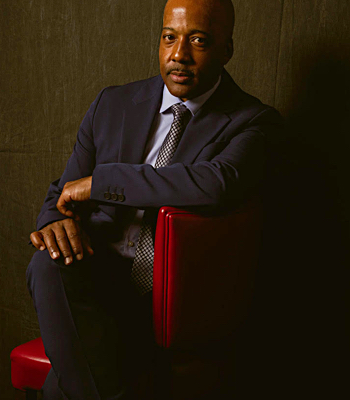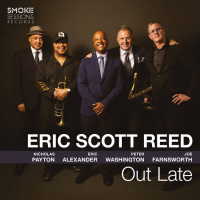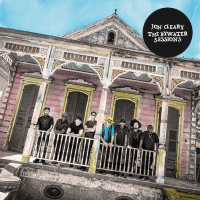Derrick Hodge is one of contemporary music’s most complete and complex artists. Also lauded as a composer, he is revered as one of the great bassists and musicians of his generation and his solo projects—Live Today (2013), The Second (2016), and Color of Noize (2020)—have been met with praise from critics and audiences alike. His albums are rich, raw and revelatory, reflecting his roots in the church, a passion for hip hop, and an eternal reverence for melody and classical composition. Like the artist, Hodge’s music contains multitudes. Growing up just outside Philadelphia, Hodge cut his teeth in the city’s neo-soul movement...
read more
Derrick Hodge is one of contemporary music’s most complete and complex artists. Also lauded as a composer, he is revered as one of the great bassists and musicians of his generation and his solo projects—Live Today (2013), The Second (2016), and Color of Noize (2020)—have been met with praise from critics and audiences alike. His albums are rich, raw and revelatory, reflecting his roots in the church, a passion for hip hop, and an eternal reverence for melody and classical composition. Like the artist, Hodge’s music contains multitudes. Growing up just outside Philadelphia, Hodge cut his teeth in the city’s neo-soul movement. At college, he became the bass player and musical director of choice for pioneers like Jill Scott, Maxwell, Floetry, Nas, Common, James Poyser and Musiq Soulchild. At the same time, he played in his university’s orchestra and in jazz circles with legendary musicians including Terence Blanchard, Donald Byrd, Mulgrew Miller and Bootsie Barnes.Hodge has played a role in countless groundbreaking projects and historic firsts. In 2022, he directed the music for the Academy Awards and arranged for Nas’s performance at the Grammys. As part of CNN’S Juneteenth celebration, he conducted the first all Black orchestra to perform at the Hollywood Bowl. In 2014 Hodge became the first Black composer to compose Hip Hop for the National Symphony when he acted as orchestral arranger and music director for the 20th anniversary celebration of Illmatic. Named one of the top moments in hip hop history by Fender Magazine, it was the first time hip hop was ever performed by the National Symphony Orchestra. He was also the first Black composer to write strings for hip hop at Carnegie Hall and the first Black composer to write symphonic music for hip hop with the Houston Symphony. Hodge has devoted himself to projects that elevate and animate the African American legacy: the struggle but also—and always—the poetry and the triumph too. It is this ability to honor and advance both culture and people that is the principle thread which weaves together Hodge’s work. He was commissioned to write music for permanent exhibitions at the Smithsonian’s National Museum of African American History and Culture. He has scored, composed, and consulted for a plethora of small and big screen works, including The Black Candle, a groundbreaking documentary about Kwanzaa narrated by Maya Angelou, and Faubourg Tremé: The Untold Story of Black New Orleans, and the 2020 blockbuster The Photograph. While Hodge often lends his talents to the specific set of cinema and storytelling which chronicles Blackness in the U.S., he is also awake to the universal nuances of the human experience. His music tells stories that are simultaneously of a people, and of the people. Hodge has founded and played in bands and groups as diverse and as influential as R+R=Now, the Robert Glasper Experiment, and The Blue Note All Stars. As a producer he has collaborated with icons including Quincy Jones, Don Was, and Common. As a musical director he has worked with luminaries including Yasiin Bey and, from 2009 to 2019, Maxwell. The Color of Noize project is Hodge’s signature concept-series, bringing together contrasting sounds, styles to create an immersive audio-visual experience. Color of Noize premiered in 2019 as part of Hodge’s artist residency at Monterey Jazz Festival, where he brought together a collection of musicians, some as young as four, to explore his compositions in a remarkably moving and beautiful concert. As he puts it “it was never just my potential that made things happen; it was my community advocating for me—now I want to advocate for others, to pass that on”. Whether collaborating with giants, writing for the big screen, forging new paths for orchestral composition, or providing access to his symphonic scores and original arrangements to HBCUs and inner city music programs, his work always contains social commentary, awareness, or insight. Here we find the fundamental character of Hodge; an incurably hopeful man, who, through his work and his art, has made the world a definitively more beautiful place.
show less













